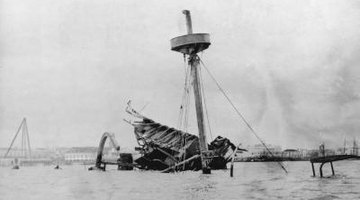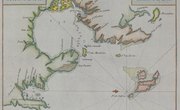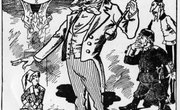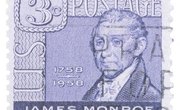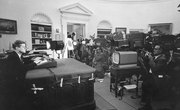Americans elected Republican William McKinley as its 25th president in 1896. He confronted a major foreign policy crisis after the USS Maine mysteriously blew up near Cuba on February 15, 1898. At first, McKinley hoped to broker a diplomatic solution with Cuba's Spanish occupiers. However, popular outrage over the "Maine" disaster, among other factors, forced McKinley to seek a congressional declaration of war against Spain in April 1898. America won the resulting four-month conflict.
Destruction of the USS Maine
The sinking of the Maine was a major factor in mobilizing the United States for war. Prompt responses by Spanish officials to help survivors initially quieted fears that the tragedy wasn't accidental -- until a naval inquiry ruled that a mine caused the explosion, the Naval History and Heritage Command website states. Lack of proof for such theories didn't prevent media outlets like the Hearst newspaper chain from printing sensational headlines -- such as "Maine Blown up by Torpedo," for example -- that McKinley had to consider in crafting any United States response, an analysis from Humboldt State University asserts.
Diplomatic Impasse With Spain
Despite the explosion, McKinley hoped to avoid conflict with Spain, which had struggled to crush a Cuban revolt for three years. During that time, about 100,000 Cuban civilians died in Spanish concentration camps. Even so, McKinley voiced a willingness to continue relations with Spain if it reversed its concentration camp policies and recognized Cuba's independence, the Spanish-American War Centennial Website states. However, Spain's proposals of limited autonomy failed to satisfy growing domestic impatience with McKinley's preference for a negotiated solution.
Media and Political Pressures
Public opinion plays a key role in presidential decision-making, and McKinley's case was no different. Support for war rose steadily through two months of negotiations -- which newspapers like the Hearst-owned "San Francisco Examiner" summarized in headlines that stated, "If There Was Treachery, Spain Must Do Battle," Humboldt State's analysis notes. By mid-April, newspapers openly urged Congress to declare war without presidential approval. Faced with mounting pressure from the press and hawks in his own party, McKinley requested a formal declaration of war on April 20, 1898. Congress voted the same day to recognize Cuba's independence and to demand that Spain give up control of the island. Spain refused and severed diplomatic ties. McKinley ordered a naval blockade on April 22 and Spain promptly declared war on the United States. Congress voted to declare war on April 25.
Promotion of American Interests
On August 12, 1898, the war ended with the United States having crushed Spanish army and naval resistance in Cuba, the Caribbean and the Philippines. For McKinley, the war's speedy resolution and lack of casualties affirmed Cuba's status as a new democratic ally and trading partner. McKinley also cited opportunities to spread democracy in pushing for ratification of the Treaty of Paris. Signed in December 1898, the treaty forced Spain to accept Cuban independence and surrender Guam, Puerto Rico and the Philippines to United States control.
Related Articles
References
Resources
- Library of Congress: The World of 1898: The Spanish-American War: The Spanish-American War of 1898: a Spanish View
- Library of Congress: The World of 1898: The Spanish-American War: William McKinley
- PBS: Crucible of Empire: The Spanish-American War
- The Spanish-American War Centennial Website: Homepage
- The University of Virginia: Miller Center: American President William McKinley (1843–1901): Foreign Affairs
Writer Bio
Ralph Heibutzki's articles have appeared in the "All Music Guide," "Goldmine," "Guitar Player" and "Vintage Guitar." He is also the author of "Unfinished Business: The Life & Times Of Danny Gatton," and holds a journalism degree from Michigan State University.

